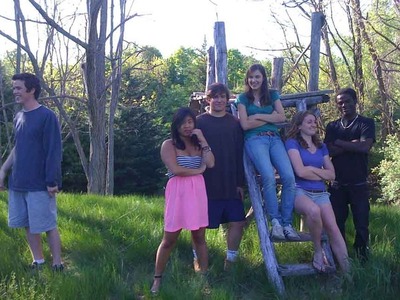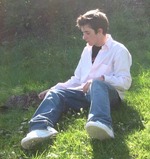(Note: Many of you were kind enough to ask for a copy of the text. As proud father I have added a few pictures to the text:)
Good afternoon class of 2010, families, and faculty. I have mixed feelings about thanking Mrs. Young for informing me that I would be speaking today. But I do want to thank her along with all of the parents, siblings, teachers, counselors and administrators for putting up with this unforgettable class of 2010. Closer to home, I’d like to thank my dad; my brother for writing this speech; my grandmother for all of the dating tips, and; my mom for the more than 2,000 lunches she’s made me over the years. (I really appreciated that change up from turkey to pesto junior year, Mom.) Finally, thank you to the class of 2010, I couldn’t ask for a better group of students to be representing today, Monument’s gonna miss us!
(L to R: Simon McTeigue, Lili Michaels, Jacob Rolf, Natalie Akers, Claire Smith, Brian Hutchison)
The other day I was watching home videos, and I noticed two patterns in the behavior of my brothers and I, which I think are universal. First, we loved being naked and we weren’t self-conscious about it. And second, we loved to laugh and smile. Watching the utter bliss on my little brother’s face made me question where it all went? Why does the happiness of children come so easily, and why do we have to work so hard at it now? It’s one of life’s great ironies that we wait until we are seventy-four to rewind back to four. We forget how simple it was to be happy as a toddler, and in all of the commotion of trying to learn, that light seems to dim or even burn out.
Monument has provided me with some of my most important experiences to date. After all, I have seen a streaker at a football game, a slip n’ slide set up in the back hall, an epic food fight in the cafeteria, and now I even have a tattoo on my ankle because I lost a bet with Mrs. Baldwin. (You’ll have to ask Mrs. Baldwin where hers is.) In all seriousness, our teachers, coaches, and counselors have taught us how to discover and probe and question and analyze. Yet, the joy a first grader feels executing their first crooked and struggling upper case “A” is now often drowned out by the bell to change classes. It is still there if we remember. We just have to un-learn a little to learn. There is a similar paradox about happiness that I have tried to embrace over my last few years here: the idea that we must sometimes be still in order to move forward.
When my older brother passed away my freshman year, I did NOT come to some grand realization about how to live my life. Instead, I became freaked out at how randomly our lives move and unfold. I started to fear the reality that anyone can leave at any time, and I wondered whether achieving high honor roll for 8 semesters would actually count more in the end than laughing hysterically with my friends, burning marshmallows around a campfire. I suddenly felt that fifteen years of my life were an accumulation of nothing “real,” and I became frantic to get real things done, fast. Yet, after I took more onto my plate and tried to tackle more than I could take down, I found my new “accomplishments” to be no more “real” or satisfying than the things I did before my brother’s death. I should have been moving out of desire to taste and experience new things. Instead, I was moving forward like the overly- serious kid who plays Mario cart. The kid that races to pick up all the gold tokens but forgets to laugh with friends after he slides out on his own banana peel. I was doing a lot, but I wasn’t doing any of it very deeply. In an attempt to “live every day,” I had actually stopped savoring each individual day. I needed to slow down and learn to be “still.” As Albert Camus wrote, “you will never be happy if you continue to search for what happiness consists of. You will never live if you are looking for the meaning of life.”
Our class will continue to move forward fast in the world as athletes, academics, business men and women, mechanics, musicians, engineers, artists, or whatever each one of us chooses. As a class, we have been eager and curious and we have never had trouble finding things to do and doing them well. Yet there is a downside to this kind of movement for movement’s sake. It’s unsustainable, and that simple happiness in the moment that comes to us so easily as a child can be slowly extinguished by the dissatisfaction that makes us jump from one thing to the next. It’s not greed, it’s just the need for motion and its natural. In fact, its how we get stuff done. We press and push forward and even sometimes backwards. But, we forget that real moments are often what lie between the commotion---in what one might call the pockets of stillness.
It is hard to explain this stillness, and it is even harder to maintain it. I’m not talking about watching “minute to win it” with a bag of pita chips on the couch (which by the way I recommend everyone do at least once). I can share one experience I had when I recently went hiking with my PEOPLE IN THE ENVIRONMENT class. The last night of our camping trip, Woody and Dakota asked me if I wanted to sprint up to the top of the mountain to try and see the sunset with them. We STRUGGLED, but once we reached the summit we were able to look out across three states. We watched the sky change from color to color and then we stood on the edge of the rocks and yelled our names into the wind. I felt five years old again, but without the urge to be naked. I didn’t feel ridiculous and I couldn’t stop smiling. My fear in the overwhelming randomness of our day-to-day lives came back to me, but in the form of confidence. As the three of us sat there saying nothing, just staring off at that horizon, it was hard not to think how small we all are. ***It was as if the more insignificant I felt, the more liberated and powerful I became. Maybe by submitting to this feeling of powerlessness, we gain the courage to be still and small and calm and THAT in turn, empowers us to listen and act and live. ****
Over the last few years, I have tried to keep in mind that time can either be seen as a series of obligations and unfulfilled wishes, or as pockets of stillness. When we learn this, we can fill our lives with whatever we love most: whether that is the natural world, athletics, family, friends, or Mario Cart. When you try to be still and live in the moment, that is the best kind of movement. It’s comforting to know that it’s really that simple.
Thanks for listening and good luck CLASS OF 2010!!!
Spencer James Akers

